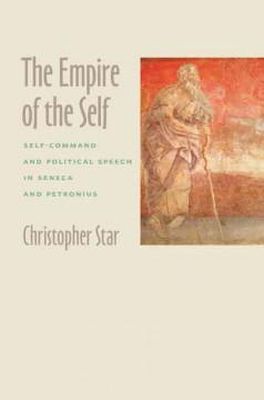
Stock image for illustration purposes only - book cover, edition or condition may vary.
The Empire of the Self. Self-command and Political Speech in Seneca and Petronius.
Christopher Star
€ 81.35
FREE Delivery in Ireland
Description for The Empire of the Self. Self-command and Political Speech in Seneca and Petronius.
He demonstrates a significant point of contact between two writers generally thought to be antagonists-the idea that imperial speech structures reveal the self. Num Pages: 312 pages. BIC Classification: DSBB; HBLA1. Category: (P) Professional & Vocational. Dimension: 161 x 235 x 25. Weight in Grams: 558.
In "The Empire of the Self", Christopher Star studies the question of how political reality affects the concepts of body, soul, and self. Star argues that during the early Roman Empire the establishment of autocracy and the development of a universal ideal of individual autonomy were mutually enhancing phenomena. The Stoic ideal of individual empire or complete self-command is a major theme of Seneca's philosophical works. The problematic consequences of this ideal are explored in Seneca's dramatic and satirical works, as well as in the novel of his contemporary, Petronius. Star examines the rhetorical links between these diverse texts. He also demonstrates a significant point of contact between two writers generally thought to be antagonists - the idea that imperial speech structures reveal the self.
Product Details
Publication date
2012
Publisher
Johns Hopkins University Press United States
Number of pages
312
Condition
New
Number of Pages
312
Format
Hardback
Place of Publication
Baltimore, MD, United States
ISBN
9781421406749
SKU
V9781421406749
Shipping Time
Usually ships in 15 to 20 working days
Ref
99-18
About Christopher Star
Christopher Star is an assistant professor of classics at Middlebury College.
Reviews for The Empire of the Self. Self-command and Political Speech in Seneca and Petronius.
This [review] can hardly do justice to the scope and richness of Star's argument in each chapter, to the thoroughness with which he discusses his chosen texts, and to the creativity with which he exploits his simultaneous treatments of Seneca and Petronius. This book makes a major contribution to the modern bibliography of selfhood and self-formation in the early empire, and it will doubtless generate further debate in so vibrant an area of study.
Gareth Williams Classical Journal With this book, Star contributes to a growing body of scholarship on the construction of the self in classical antiquity. Choice If this book only managed to demonstrate
as it unquestionably does
the complementary intertexuality of the Satyricon with Senecan philosophy, that alone would be a noteworthy achievement. But in fact The Empire of the Self is rife with compelling readings of its target texts that have ramifications beyond a narrow understanding of either author of their relationship to one another. Star's study offers its readers valuable insights into the governing metaphors and preoccupations of the Roman intelligentsia in the mid-first century CE.
Amanda Wilcox Bryn Mawr Classical Review Star has performed a valuable service in presenting a fresh approach to familiar authors which helps the discussion to move beyond some of the established academic truisms of the last few decades, and identifying the common conceptual ground that they share. He offers us a fresh perspective on both Seneca's and Petronius' views of self-fashioning, making a major contribution to several recent areas of interest within classics. Both graduate students and scholars working on Neronian literature or Roman concepts of identity will benefit from reading Star's argument. Hermathena
Gareth Williams Classical Journal With this book, Star contributes to a growing body of scholarship on the construction of the self in classical antiquity. Choice If this book only managed to demonstrate
as it unquestionably does
the complementary intertexuality of the Satyricon with Senecan philosophy, that alone would be a noteworthy achievement. But in fact The Empire of the Self is rife with compelling readings of its target texts that have ramifications beyond a narrow understanding of either author of their relationship to one another. Star's study offers its readers valuable insights into the governing metaphors and preoccupations of the Roman intelligentsia in the mid-first century CE.
Amanda Wilcox Bryn Mawr Classical Review Star has performed a valuable service in presenting a fresh approach to familiar authors which helps the discussion to move beyond some of the established academic truisms of the last few decades, and identifying the common conceptual ground that they share. He offers us a fresh perspective on both Seneca's and Petronius' views of self-fashioning, making a major contribution to several recent areas of interest within classics. Both graduate students and scholars working on Neronian literature or Roman concepts of identity will benefit from reading Star's argument. Hermathena
